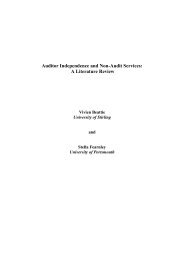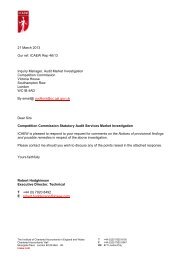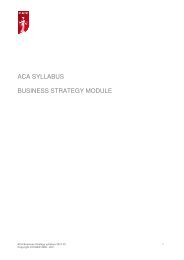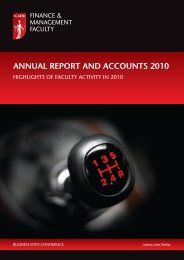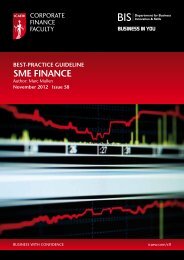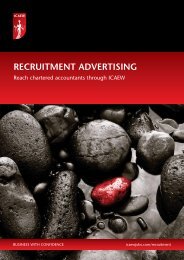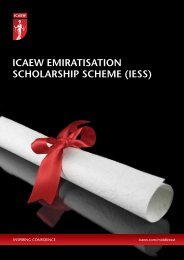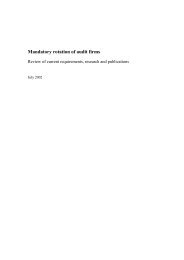Acting in the public interest â a framework for analysis - ICAEW
Acting in the public interest â a framework for analysis - ICAEW
Acting in the public interest â a framework for analysis - ICAEW
- No tags were found...
You also want an ePaper? Increase the reach of your titles
YUMPU automatically turns print PDFs into web optimized ePapers that Google loves.
Panel 8.3: UK competition policy and <strong>the</strong> <strong>public</strong> <strong>in</strong>terest (cont<strong>in</strong>ued)In <strong>the</strong> UK Enterprise Act 2002, <strong>public</strong> <strong>in</strong>terest was directly preserved only <strong>for</strong> media mergers,where guidance was given that matters such as accurate presentation, free expressionof op<strong>in</strong>ion and plurality of views – ‘to <strong>the</strong> extent reasonable and practicable’ – would beconsidered. 184 In o<strong>the</strong>r cases <strong>the</strong> <strong>public</strong> <strong>in</strong>terest test was replaced by and large, with a purecompetition-based test, although <strong>the</strong> Secretary of State (that is, <strong>the</strong> UK government) reta<strong>in</strong>ed<strong>the</strong> power to <strong>in</strong>tervene <strong>in</strong> cases where <strong>the</strong> <strong>public</strong> <strong>in</strong>terest merited it. 185 This effectively seemedto be say<strong>in</strong>g that it is up to <strong>the</strong> government to determ<strong>in</strong>e <strong>the</strong> <strong>public</strong> <strong>in</strong>terest, which isconsistent with our observations <strong>in</strong> <strong>the</strong> next chapter on government authority.8.2.4 InteractionDecisions as to what someone should do, cannot usually be made <strong>in</strong> isolation: it is often <strong>the</strong>case that one person’s actions will <strong>in</strong>fluence those of o<strong>the</strong>rs.Game <strong>the</strong>ory works on <strong>the</strong> premise that to every action <strong>the</strong>re is a reaction by o<strong>the</strong>r ‘players’.The reaction can, <strong>in</strong> pr<strong>in</strong>ciple, be predicted by consider<strong>in</strong>g <strong>the</strong> rules of ‘<strong>the</strong> game’ although ithas been noted that <strong>in</strong> some circumstances <strong>the</strong>re are no rules: a freewheel<strong>in</strong>g game. In suchcircumstances it has been suggested that <strong>the</strong> premise should be that a player does not get outof <strong>the</strong> game more than he or she puts <strong>in</strong>to it. 186 If <strong>the</strong> likely reaction is not what is desired, <strong>the</strong>nei<strong>the</strong>r <strong>the</strong> <strong>in</strong>itial action needs to be changed, or a more lateral approach applied: change <strong>the</strong>players, change <strong>the</strong> rules, enlist allies, tie people <strong>in</strong> or change <strong>the</strong> added value. Commercialexamples of <strong>the</strong>se sorts of behaviour <strong>in</strong>clude subsidis<strong>in</strong>g <strong>the</strong> costs of products which <strong>the</strong>n needexpensive consumables, long-term exclusivity contracts, and add<strong>in</strong>g quality to <strong>the</strong> product.One key problem with game <strong>the</strong>ory is that it presupposes rational, <strong>in</strong><strong>for</strong>med behaviour by <strong>the</strong>o<strong>the</strong>r players. 187 As discussed fur<strong>the</strong>r below, this is not necessarily <strong>the</strong> case.8.2.5 Weight<strong>in</strong>g of <strong>in</strong>terestsFrom a <strong>public</strong> <strong>in</strong>terest perspective <strong>the</strong> key aspect is not <strong>the</strong> weight<strong>in</strong>g that one <strong>in</strong>dividualundertakes between his or her collection of <strong>in</strong>terests, but how <strong>the</strong> <strong>in</strong>terests of different<strong>in</strong>dividuals, groups and even societies, are weighted. It can be argued that <strong>the</strong>re should beno weight<strong>in</strong>g at all: ‘<strong>the</strong> good of any one <strong>in</strong>dividual is of no more importance, from <strong>the</strong> po<strong>in</strong>tof view …of <strong>the</strong> universe, than <strong>the</strong> good of any o<strong>the</strong>r’. 188 However, this does not recognisethat people have vary<strong>in</strong>g needs, abilities and relative <strong>in</strong>terests <strong>in</strong> an issue, hence <strong>the</strong> caveat:‘unless…<strong>the</strong>re are special grounds <strong>for</strong> believ<strong>in</strong>g <strong>the</strong> more good is likely to be realised <strong>in</strong> <strong>the</strong>one case than <strong>in</strong> <strong>the</strong> o<strong>the</strong>r.’This <strong>in</strong>convenient but real issue causes problems: ‘<strong>the</strong> most common and most durablesource of factions has been <strong>the</strong> various and unequal distribution of property’, which has been<strong>in</strong>terpreted also to <strong>in</strong>clude abilities. ‘Those who hold and those who are without property have189 190ever <strong>for</strong>med dist<strong>in</strong>ct <strong>in</strong>terests <strong>in</strong> society.’In practice, weight<strong>in</strong>g is applied <strong>in</strong> a wide range of decisions. Politicians, <strong>for</strong> example, will atleast <strong>in</strong> <strong>the</strong>ory, tend to have more regard to poorer/disadvantaged citizens when determ<strong>in</strong><strong>in</strong>gtaxation and social spend<strong>in</strong>g policies. This can be defended up to a po<strong>in</strong>t on utilitarian groundsas <strong>the</strong> marg<strong>in</strong>al value of one pound is greater <strong>for</strong> a poor person than a well off one. A counterargumentwould be that if this is taken to <strong>the</strong> extreme, taxation/benefits would cont<strong>in</strong>ue untileveryone had <strong>the</strong> same <strong>in</strong>come, reduce <strong>in</strong>centive and thus reduce <strong>the</strong> overall pot.With<strong>in</strong> <strong>the</strong> UK accountancy profession, such discussion as <strong>the</strong>re is <strong>in</strong> <strong>the</strong> profession’s codesand o<strong>the</strong>r writ<strong>in</strong>gs implies that ‘<strong>the</strong> <strong>public</strong> <strong>in</strong>terest’ has a sense of ‘majority satisfaction’: somesituations aris<strong>in</strong>g where part of <strong>the</strong> <strong>public</strong> would be satisfied at <strong>the</strong> expense of o<strong>the</strong>r parts. 191‘National security’ is often a trump card applied although even here o<strong>the</strong>r <strong>in</strong>terests cannotbe completely dismissed. An example of this is a seventeenth century English court casewhich decided that <strong>the</strong> K<strong>in</strong>g could remove vital m<strong>in</strong>erals from a private <strong>in</strong>dividual’s land as<strong>the</strong> tak<strong>in</strong>g was considered to ‘extend to <strong>the</strong> defence of <strong>the</strong> whole realm, <strong>in</strong> which everysubject hath benefit’. It was also ordered that <strong>the</strong> K<strong>in</strong>g should restore <strong>the</strong> land afterwards. 192184Department <strong>for</strong> Bus<strong>in</strong>ess Innovation and Skills, Enterprise Act 2002: Public Interest Intervention <strong>in</strong> Media Mergers.185Ibid.186Brandenburger and Nalebuff, ‘The Right Game: Use Game Theory to Shape Strategy’.187Rappeport, ‘Game Theory Versus Practice’.188Sidgwick quoted <strong>in</strong> Schultz, ‘Henry Sidgwick’.189James Madison, quoted <strong>in</strong> Faulhaber, ‘The Rise and Fall of ‘Self Interest’’.190Faulhaber, ibid, on Madison.191The Accountancy Foundation Review Board, Protect<strong>in</strong>g <strong>the</strong> Public Interest.192‘The K<strong>in</strong>gs Prerogative <strong>in</strong> Saltpetre’ discussed <strong>in</strong> Manfredo, ‘Public Use & Public Benefit: The Battle <strong>for</strong> Upstate New York’.Aggregation and decision57



